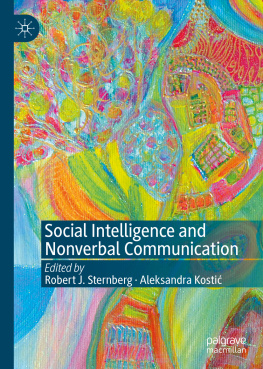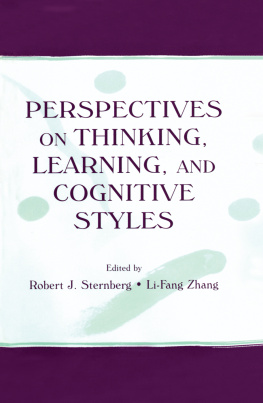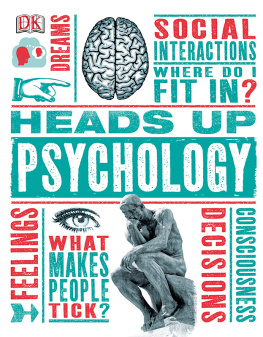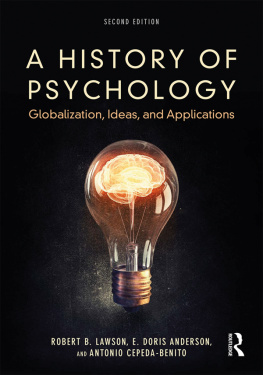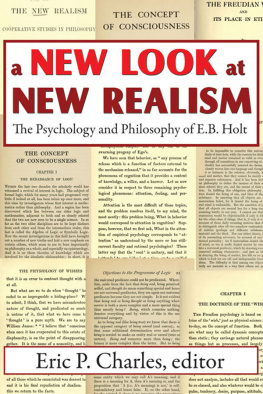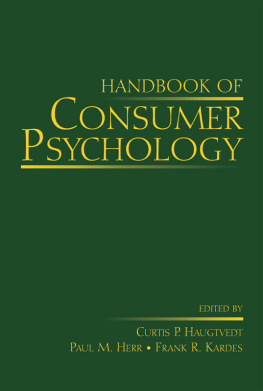We cannot understand contemporary psychology without first researching its history. Unlike other books on the history of psychology, which are chronologically ordered, this Handbook is organized topically. It covers the history of ideas in multiple areas of the field and reviews the intellectual history behind the major topics of investigation. The evolution of psychological ideas is described alongside an analysis of their surrounding context. Readers learn how eminent psychologists draw on the context of their time and place for ideas and practices and shows how innovation in psychology is an ongoing dialogue between past, present, and anticipated future.
Robert J. Sternberg is Professor of Human Development at Cornell University, New York and Honorary Professor of Psychology at Heidelberg University, Germany. He has also won the William James Award and the James McKeen Cattell Award from Association for Psychological Science (APS) and the Grawemeyer Award in Psychology. He is past-president of the American Psychological Association.
Wade E. Pickren is Director of the Center for Faculty Excellence at Ithaca College, New York. He was the founding director of the American Psychological Association (APA) Archives and served as its first historian. He also served as editor of History of Psychology from 2010 to 2015.
Robert J. Sternberg
Wade E. Pickren
University Printing House, Cambridge CB2 8BS, United Kingdom
One Liberty Plaza, 20th Floor, New York, NY 10006, USA
477 Williamstown Road, Port Melbourne, VIC 3207, Australia
314321, 3rd Floor, Plot 3, Splendor Forum, Jasola District Centre, New Delhi 110025, India
79 Anson Road, #0604/06, Singapore 079906
Cambridge University Press is part of the University of Cambridge.
It furthers the Universitys mission by disseminating knowledge in the pursuit of education, learning, and research at the highest international levels of excellence.
www.cambridge.org
Information on this title: www.cambridge.org/9781108418690
DOI: 10.1017/9781108290876
Cambridge University Press 2019
This publication is in copyright. Subject to statutory exception and to the provisions of relevant collective licensing agreements, no reproduction of any part may take place without the written permission of Cambridge University Press.
First published 2019
Printed and bound in Great Britain by Clays Ltd, Elcograf S.p.A.
A catalogue record for this publication is available from the British Library.
Library of Congress Cataloging-in-Publication Data
Names: Sternberg, Robert J., editor. | Pickren, Wade E., editor.
Title: The Cambridge handbook of the intellectual history of psychology / edited by Robert J. Sternberg, Wade E. Pickren.
Other titles: Handbook of the intellectual history of psychology | Intellectual history of psychology | Cambridge handbooks in psychology.
Description: Cambridge, United Kingdom ; New York, NY : Cambridge University Press, 2019. | Series: Cambridge handbooks in psychology | Includes bibliographical references and index.
Identifiers: LCCN 2018050897 | ISBN 9781108418690 (hardback : alk. paper) | ISBN 9781108406345 (pbk. : alk. paper)
Subjects: | MESH: Psychologyhistory
Classification: LCC RC467 | NLM BF 81 | DDC 616.89dc23
LC record available at https://lccn.loc.gov/2018050897
ISBN 978-1-108-41869-0 Hardback
ISBN 978-1-108-40634-5 Paperback
Cambridge University Press has no responsibility for the persistence or accuracy of URLs for external or third-party internet websites referred to in this publication and does not guarantee that any content on such websites is, or will remain, accurate or appropriate.
Contents
Robert J. Sternberg and Wade E. Pickren
John G. Benjafield
Daniel J. Denis and Briana Young
Gary G. Berntson and David Hothersall
Linda M. Bartoshuk
Michael I. Posner
Mark E. Bouton and Robert A. Boakes
Henry L. Roediger III and Jeremy K. Yamashiro
Yuval Erez and Valerie F. Reyna
Christa L. Taylor, Vlad P. Glveanu, Allison B. Kaufman, and James C. Kaufman
Robert J. Sternberg
Jeremy Burman
Cathy Faye
Alexandra Rutherford
David Devonis
Richard M. Ryan, Emma L. Bradshaw, and Edward L. Deci
James N. Butcher
Petteri Pietikainen
Roderick D. Buchanan and Nick Haslam
Wade E. Pickren
Figures
Tables
Contributors
Linda M. Bartoshuk , University of Florida
John G. Benjafield, Brock University
Gary G. Berntson , Ohio State University
Robert A. Boakes , University of Sydney
Mark E. Bouton , University of Vermont
Emma L. Bradshaw , Australian Catholic University
Roderick D. Buchanan , University of Melbourne
Jeremy Burman , University of Groningen
James N. Butcher , University of Minnesota
Edward L. Deci , University of Rochester
Daniel J. Denis , University of Montana
David Devonis , Graceland University
Yuval Erez , Cornell University
Cathy Faye , University of Akron
Vlad P. Glveanu , Webster University, Geneva
Nick Haslam , University of Melbourne
David Hothersall , Ohio State University
Allison B. Kaufman , University of Connecticut
James C. Kaufman , University of Connecticut
Wade E. Pickren , Ithaca College
Petteri Pietikainen , University of Oulu
Michael I. Posner , University of Oregon
Valerie F. Reyna , Cornell University
Henry L. Roediger , III, Washington University, St. Louis
Alexandra Rutherford , York University
Richard M. Ryan , Australian Catholic University
Robert J. Sternberg , Cornell University
Christa L. Taylor , Yale University
Jeremy K. Yamashiro , Washington University, St. Louis
Briana Young , University of Montana
Introduction
Robert J. Sternberg and Wade E. Pickren
Do You Know Who Gordon Bower Is? Endel Tulving?
These are questions the senior editor has asked of his classes at Cornell University and at Heidelberg University (Germany) the last several years. The students are among the best in their respective nations. Almost none of them recognize either name, much less what they contributed to psychology. Thats a shame, because contemporary memory research would look very different, and much the worse, were it not for the influences of Bower and Tulving. The names of earlier greats of the field Clark Hull, Edwin Guthrie, Edward Tolman, George Kelly, Julian Rotter, Eleanor Gibson, even Edward Titchener (an early Cornell psychologist) draw similar blank looks from Sternbergs students. The students know neither who these great psychologists were nor, more importantly, what they contributed to the intellectual history of the field. The students know a few names from the past Freud, Piaget, Skinner but often have only rather vague ideas of what these thinkers proposed, as much of what they did is viewed today as history.


